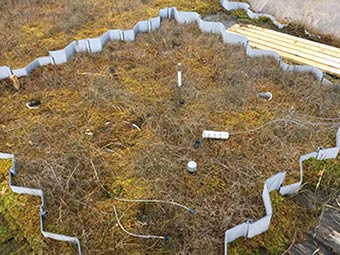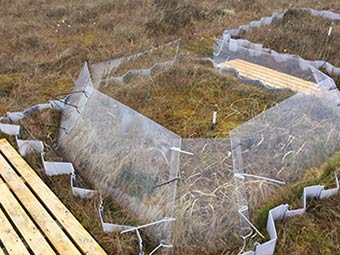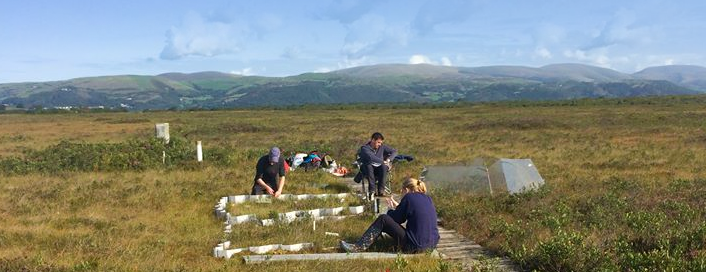Peatlands and climate change: linking the past with the future
Peatlands are of great economic, ecological and environmental importance. 70% of UK drinking water derives from peatland dominated areas. Peatlands are home to many rare or specialised species of animals and plants, and are a globally important store of carbon, around 600GtC. Peatlands are vulnerable to disturbance, which may lead to carbon release, contributing to climate change. In a world with warmer temperatures and more frequent droughts, there is uncertainty about how peatlands will change in the future. In our research project, we are investigating how climate change will affect peatlands using a long-term experiment and palaeoecological studies.
Linking the past and the future
Previous studies have often investigated how peatlands respond to climate change by taking one of two approaches. Some studies have conducted experiments, warming and drying peat and monitoring changes. Other studies have looked to the past, taking peat cores and comparing periods of the past with different climates. Both types of studies have strengths and weaknesses and the results often differ. This difference in results is a concern and it is currently unclear whether peatlands may ameliorate future climate change, or make it even worse.
The two types of studies are usually conducted separately, but in our project we are doing things differently by bringing both approaches together in the same place at the same time. Over the three and a half years of the project we will be comparing how a bog in west Wales has responded to experimental climate change with how it has changed through time, comparing modern carbon budgets with long-term carbon accumulation and looking at how palaeoclimate proxies respond to known climate changes. By doing this we aim to get a deeper and more nuanced understanding of how peatlands may respond to future climate change.
The Cors Fochno experiment
Cors Fochno is located on the coast of mid-west Wales, south of the Dyfi estuary. This bog is considered one of the most intact peatlands in England and Wales and is managed as a National Nature Reserve by Natural Resources Wales. The site is designated as a Special Area of Conservation (SAC), representing part of the only UNESCO biosphere reserve in Wales, as well as being part of a Special Protection Area (SPA), a Ramsar Conservation site, and a Site of Special Scientific Interest (SSSI).
Since 2010 our team has been conducting a long-term experiment at Cors Fochno to investigate how the bog may respond to a climate which is warmer and has more frequent droughts. The experiment includes plots which are warmed using open top ‘mini-greenhouses’ and plots which are subjected to drought by pumping out water during the summer. The experiment is one of very few field climate change experiments in peatlands and is the only experiment in the world which simulates both warming and short-term drought. In our study, we are comparing how the bog has responded to these experimental treatments with how it has changed naturally through time.


The team
Luke is the PhD student on this project. Luke has a BSc in Physical Geography from Aberystwyth University and an MSc in Environmental Archaeology from the University of Reading.
Maria is the postdoctoral research assistant on this project. Her Bachelor’s Degree is in Earth Science and she has an MRes in Global Environmental Change. She undertook a PhD investigating the record of volcanic ash-fall events recorded in peat and lake sites in northern New Zealand and has been a researcher on a number of projects in palaeoenvironmental change.
James is a Senior Lecturer at Edge Hill University and a co-investigator on the project. His main research interests are in ecosystem carbon cycling.
Nancy is based at the Centre for Ecology and Hydrology and is a co-investigator on the project. Her research focuses on the biogeochemistry of terrestrial ecosystems, in particular, the impacts of chronic, low-level air pollution and climate change on natural and human ecosystems.
Simon is a Professor in Ecology & Environmental Science at Manchester Metropolitan University and a co-investigator in the project. Simon’s broad expertise and research interests range from air pollution effects to Sphagnum moss biology and peatland restoration.
Everyone at the Department is enormously saddened by the news regarding Richard Payne's fatal accident in the Himalayas in May 2019. Our thoughts remain with Richard's family, friends and colleagues at this difficult time. Read our tribute to Richard.
Funding and partnerships
This project is funded by the Leverhulme Trust and is a collaborative venture between researchers at The University of York, Edge Hill University, Manchester Metropolitan University and the Centre for Ecology and Hydrology.


